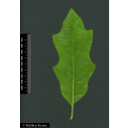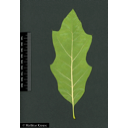Useful information about the taxon (species, subspecies, variety...)
Quercus × leana Nutt. 1842
(Q. imbricaria × Q. velutina)
Fagaceae
(APG IV)Lea's hybrid oak, Lea oak
Taxon concept: The Plant List (2014), version 1.1
Distribution: Eastern North America
Size: 12 - 18 (m)
Quercus × leana Nutt. - Accepted: Quercus × leana Nutt. bei The Plant List (2014), version 1.1; Familie: Fagaceae (APG III)
- Color of flower
- yellowish green
- Flowers
- monoecious; flowers in separate male and female catkins
- Life form
- tree
- Leaves
- thick and coriaceous; oblong to obovate, sinuate-lobed margin with bristle-tipped lobes; lower surface with rusty pubescence; petiole 1.5-2 cm long
- Foliage persistence
- deciduous
- Fruits
- acorn with saucer-shaped cupule
- Soil conditions
- preferentially on lime-free, well-drained soils
- Constraints according moisture
- drought tolerant
- Comments
- is a hybrid of Quercus imbricaria Michx. with Quercus velutina Lam. (according to Engelmann a hybrid ofQuercus imbricaria Michx. with Quercus coccinea Münchh.)
- Usage
- as ornamental tree for parks and lawns (street tree)
- Bark
- dark grey, slightly furrowed
Plants for a Future (1996-2012): PFAF. See: https://pfaf.org/; The International Plant Names Index (2009). Published on the Internet http://www.ipni.org; Courtesy to IPNI, 2009. Exported from IPNI at date: 2009-09-22 20:17:51;
Diese Webseite verwendet Google Maps, um Karten und Standorte von Pflanzen in den Hohenheimer Gärten anzuzeigen. Dadurch werden unter Umständen Daten an Google weitergeleitet, was mit einer Verarbeitung Ihrer personenbezogenen Daten verbunden sein kann. Die Datenschutzerklärung von Google finden Sie hier: Datenschutzerklärung von Google
| Sex | Standort | Accession number | Planting year | Donation | IPEN | Lat. | Long. |
|---|---|---|---|---|---|---|---|
| Parzelle K | EG-K-034-18227 | 1997 | XX-0-HOH-EG-K-034-18227 | 48,7099535706 | 9,2085736146 |


